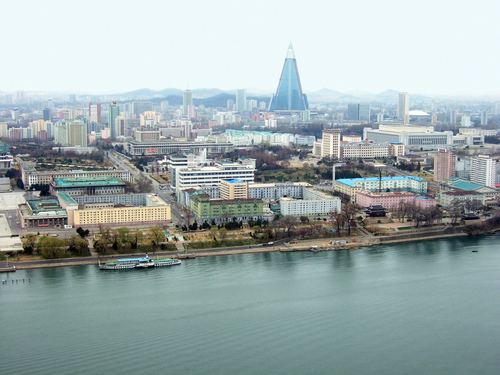Is North Korea’s Economy Turning Around Under Kim Jong-un?

Please note that we are not authorised to provide any investment advice. The content on this page is for information purposes only.
The longevity of Kim Jong-un’s regime in North Korea has been subject to widespread speculation by outside observers. Several factors led some to predict an early downfall for the regime: young and immature leadership, a potential factional struggle, a stagnant economy and a hostile external environment. But this prediction has not yet been realised. The Kim Jong-un regime is alive and well. It has been surviving, if not thriving, with stable political leadership and a gradual economic recovery.
The longevity of Kim Jong-un’s regime in North Korea has been subject to widespread speculation by outside observers. Several factors led some to predict an early downfall for the regime: young and immature leadership, a potential factional struggle, a stagnant economy and a hostile external environment. But this prediction has not yet been realised. The Kim Jong-un regime is alive and well. It has been surviving, if not thriving, with stable political leadership and a gradual economic recovery.
The purge and execution of Kim Jong-un’s uncle, Jang Sung-thaek, then the second in charge, sent shockwaves through the world in 2013. Some pundits saw it as a prelude to a new power struggle that would foster the coming collapse of Kim’s regime. But since then, the opposite seems to have occurred. Kim Jong-un is in firm control of the Workers’ Party of Korea (WPK), the military, and the state. With Jang’s removal, he is not only reigning, but also ruling the daily operation of the North Korean system. Consolidation of power through new personal and institutional arrangements has further strengthened his grip over national governance.
Kim Jong-un’s father, Kim Jong-il, ruled the country rather arbitrarily with his own personal charisma, emphasising Songun (military-first politics) ideology — while downplaying the party-centred governance system. In contrast, Kim Jong-un has completely restored the primacy of the WPK over the military and the state. This move has been evidenced by the take-over of the military by civilian party officials: first by Choe Ryong-hae and later by Hwang Pyong-so, appointed as head of the General Political Bureau of People’s Army that oversees the entire military. Kim has also created a troika system composed of his loyalists that assists his rule. The troika includes party secretary Choe Ryong-hae, Vice Marshal Hwang Pyong-so, and Prime Minister Pak Pong-ju. Choe manages the WPK, Hwang is in charge of the military and Pak runs the cabinet. North Korea under Kim Jong-un’s leadership is likely to be stable for the time being, because, at least so far, there are no opposition blocs. Political rivals or popular dissenting groups have not yet emerged.
The North Korean economy has also performed better since Kim Jong-un’s inauguration. According to the Bank of Korea (the central bank of South Korea), North Korea’s growth rate recorded 0.8 per cent in 2011, 1.3 per cent in 2012, and 1.1 per cent in 2013. Given its chronic negative growth rates before 2011, such records are quite impressive. And outsiders who travelled to North Korea have commonly acknowledged that the overall living conditions of its people, including food and other consumer goods, have significantly improved. This can be attributed partly to an increase in exports of coal, minerals, and fishery products to China; growth in foreign earnings through manpower exports to China, Russia, and the Middle East; and a relatively good harvest over the past three years.
Equally crucial are economic reform measures. On 28 June 2012, Pyongyang introduced an incentive driven new economic management system known as the ‘June 28 measure’. The measure stipulates that those who produce more are entitled to have more. For example, a collective farm is now subdivided into several farm households each of which is composed of three or four families. Those farm households retain about 30 per cent of the crops they harvest, while 70 per cent goes to the government. The produce that is retained by farm households can now be traded in 380 farmers’ markets throughout the country. This represents a substantial change. (In the past, the government took the entire harvest and rationed portions to farmers through a public distribution system). A similar incentive system is now being applied to state firms. In this way, a more competitive market system is slowly being adopted.
Kim also instructed the cabinet to exercise unified leadership in economic management, and, at the same time, banned intervention by the party and the military — which was a major source of policy discord and confusion. In addition, the North Korean government has designated 19 special economic development zones in addition to five state-level special economic zones (such as Rajin-Sonbong and Kaesung). Such institutional reforms have played a positive role in boosting the nation’s otherwise stagnant economy.
But despite these reforms, it will be impossible for North Korea to revitalise its national economy and to improve its people’s living standards without the injection of external assistance and foreign capital. As long as Kim Jong-un adheres to the simultaneous pursuit of two overarching political goals (the ‘byungjin’ line) — economic development and nuclear weapons — it will be nearly impossible to attract foreign capital and assistance. Apart from the nuclear issue, its human rights violations and cyber hacking will further jeopardise its external relations.
Unless the North Korean leader takes decisive measures towards denuclearisation, improving of human rights and good cyber behaviour, it will be quite difficult for North Korea to break the vicious circle of external sanctions and economic hardship. Pyongyang’s rigid stance and a hostile external environment are likely to make 2015 another year of isolation and hardship.
Kim Jong-un secure as North Korean economy picks up is republished with permission from East Asia Forum




